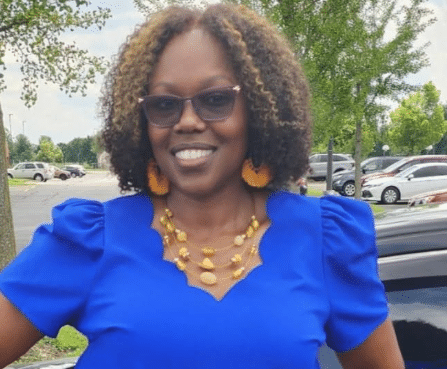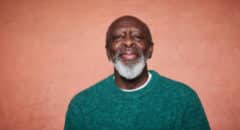
When Valarie first started feeling tired and having frequent nosebleeds, she simply thought it was because she was so busy.
“I just chalked it up to being busy. I was doing a lot — I called it my ‘superwoman syndrome.’ I was working long hours, really involved in church activities, and I had gone back to school. So I assumed I was just running myself ragged, overdoing it,” Valarie tells BlackDoctor.org.
Even with a history of anemia, she didn’t consider that something more serious could be the cause.
“In hindsight, I knew something was going on, but at the time I just thought, ‘Hey, my anemia is acting up, I need more iron supplements.’ I never thought it could possibly be an incurable cancer,” she adds.
Fighting for a Diagnosis
For months, her recurring infections were treated at urgent care centers without deeper investigation.
“I’d go to urgent care, and they’d treat whatever it was… with antibiotics,” she shares.
She now wishes she had pushed further.
“But no one ever asked, ‘Why do you keep coming back? Didn’t you just deal with this last month?’”
Things didn’t shift until she got a severe case of the flu.
“You don’t have the flu for that long… That’s when I decided to see my primary care doctor. That decision shifted things. I learned I had to advocate for myself, because otherwise they were just going to keep pumping me with meds and never look at the root cause,” Valarie says.
Her persistence led to a diagnosis of multiple myeloma.
Coping with Cancer—Twice
At just 42 years old, Valarie was stunned to hear she had an incurable cancer.
“Learning I had multiple myeloma was devastating. I was young, in my early 40s, in what I considered my prime, and I never imagined cancer would be part of my story. To hear, ‘You have cancer — and not just cancer, but an incurable cancer,’ shook me to my core,” she shares.
As she adjusted to her “new normal,” she was dealt another devastating blow: breast cancer. “That was an even bigger blow. I thought, ‘I’ve already had cancer, I went through that — and now here we go again.’ It put me in a dark place,” Valarie recalls.
For Valarie, breast cancer hit differently.
“I had seen what it could do through several aunts who had it, so I wasn’t ready to walk that road. It felt overwhelming. Part of it was also about identity — as women, our breasts represent so much, and facing the possibility of losing them was incredibly hard,” she shares.
Disparities and Early Detection
Valarie has been outspoken about the health disparities Black women face when it comes to cancer. Black women still have a four percent lower incidence rate of breast cancer than white women, but a 40 percent higher breast cancer death rate.
“When we talk about disparities, whether in breast cancer or multiple myeloma, it’s often not about the disease itself but about access, awareness, and action,” Valarie shares. “For example, my breast cancer was caught during a routine screening mammogram. I didn’t feel a lump during self-exams. That’s why screenings are so important. If you’re eligible, get them. If you’re high-risk — with a family history, ask for screenings earlier.”
She emphasizes the importance of advocating for tests, even when guidelines say you’re “too young.”
“Both multiple myeloma and breast cancer disproportionately affect our community, yet many people have never even heard of myeloma,” Valarie says. “When I go to community events, so many people are learning about it for the first time. That has to change. If a disease affects us at two to three times the rate, we need to know it exists.”
Beyond that, Valarie says the healthcare system has to listen and make sure communities of color have the resources and support they deserve.
“We also need more representation — in research, clinical trials, and in decision-making about our care. Closing the gap requires the system to truly see us, listen to us, and give us the same survival opportunities as everyone else,” she explains.
Finding Hope at City of Hope
At her family’s urging, Valarie sought a second opinion at City of Hope.
“I first went to City of Hope for a second opinion at the urging of my family back in Virginia,” Valarie, who currently lives in Chicago, notes. “When I was diagnosed, I was out here alone. One of my aunts said, ‘You need to go to City of Hope — that’s what they do.’”
Valarie hadn’t had the best experience at her local clinic, and when she arrived at City of Hope, she was in bad shape with extremely low hemoglobin.
“I didn’t realize it at the time, but I ended up being admitted to the hospital. I wasn’t sure what to expect, but the moment I walked in, even though I couldn’t walk and had to be wheeled in, I felt like a person — not just a cancer patient,” she recalls.
That experience convinced her to stay.
“The dedication to patients there stood out,” she adds. “Honestly, I wouldn’t be where I am today without City of Hope. Multiple myeloma is complex, and you need a specialist. I knew right away I wouldn’t be going back to my local hospital — I was going to stay at City of Hope to get the care I needed.”
Walking for Hope
Today, Valarie channels her experience into advocacy, especially through City of Hope’s Walk for Hope event.
“The Walk for Hope is more than just a fundraising event. It’s a celebration of survival, of community, and of hope,” she says. “For me, as a multiple myeloma and breast cancer survivor, it’s about shining a light on others’ experiences too — especially those facing disparities. Participating allows me to give back, raise awareness, and inspire others to take charge of their health, while also supporting critical research that saves lives. It’s about turning my challenges into purpose, and letting others know they’re not alone.”
She encourages people to come out and join her at the Walk for Hope in Chicago in October.
“Supporting events like this helps fund research and care, and it allows us to turn our experiences into meaningful action that benefits others,” she notes.
Words for Others Facing Cancer
As a coach and mentor to newly diagnosed patients, Valarie shares three key pieces of advice:
- Stay connected with others on the same journey.
- Learn as much as you can about your disease.
- Find something that gives you hope and focus on it during dark days.
Valarie also knows firsthand how vital community can be.
“Community has been essential. My family, even miles away, supported me in many ways. My friends, church family, and local support groups helped too,” she says. “People brought meals, ran errands, prayed with me, sent scripture, [and] sat with me in silence. Those things fueled me. We celebrated small victories together, and that reminded me I wasn’t alone. That love and support gave me the strength and confidence not only to focus on healing but also to advocate for others.”
Where She Is Today
Valarie is currently on maintenance treatment for multiple myeloma, and her triple-negative breast cancer is in remission. But the possibility of recurrence is always on her mind.
“I’d be lying if I said I don’t think about relapse or recurrence. Multiple myeloma is incurable, and with triple-negative breast cancer, recurrence is always a possibility. Sometimes I feel like I’m looking over my shoulder. But I don’t let that steal my days,” she shares. “I focus on the community I’ve built, stay connected, and continue advocating. Through cancer, I discovered my purpose — helping others.”
And for those still in the fight, her message is clear: “Those feelings are valid, but you’re not alone. Take things one day at a time. Lean on your support system. Even in the hardest moments, hold on to hope. You’re stronger than you realize. And when you feel like you don’t have strength, remember there’s a community ready to walk beside you — you just have to be open to that support.”









